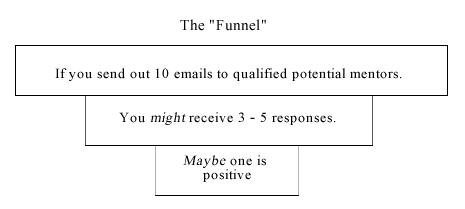Finding a Mentor for Science Research
written by ScienceBuddies.org
- Determine your general areas of interest: physics, chemistry, biology, psychology, astronomy, etc.
- Search nearby research university websites for scientists in the departments of these schools. You want someone who is actively publishing research in his or her field, or in engineering, someone working directly on cutting-edge products or techniques in the area.
- At the department webpage for the university, bring up the faculty biographies. Read through them all, noting the email addresses or contact information for those you are interested in.
- Once you've gathered 20-30 professors' biographies, research them one by one. Prior to contact, you must find recent articles written by the potential mentor. This is extremely important. You don't want to look like an idiot when you contact him or her, and it will also help you determine if the person is involved in research that is similar to your project.
- Draft a personalized email in which you identify yourself, your school, and identify specifically what interested you about the scientist's research. In the email, you should never directly ask "to be my mentor." Instead, you might want to mention that you are interested in doing research, in general. Request a meeting so you can speak more about his or her research. You might also ask him or her to distribute your request throughout the department if he or she cannot help you. One of his or her colleagues might be looking for a student with whom to do research. (This is actually how one of my friends from Science Talent Search got a mentor. The person she emailed was nice enough to send her request to others in the department, and someone else replied.)
- Have someone proofread and edit the letter.
- Mail it out and hope for the best. Note that you might go through numerous rejections until you find someone who wants to help you. Some of the people you contact might not even respond. When I emailed judges, there were always a few who never replied. Keep meeting and calling people! Eventually, you should be able to find a potential mentor. Often, the response to the email alone is only 33%-50%, so don't lose hope if only a few potential mentors reply. Positive responses range from less than 10% to as much as 33% (determined by asking a few fellow students involved in research).

Possible objections from potential mentor:
- Don't have the time.
- Don't have the resources. For example, there might not be space in the lab.
- Just not interested in working with high school students.
- Potential mentor might not be familiar with high school competitions and/or might think that a high school student should not do or is incapable of doing research in his or her area of expertise.
For most of these, there's nothing that can be done; however, if the last one is known to be the problem, you can send the potential mentor to the Mentoring & Coaching Advanced High School Student Research page on the Science Buddies website.
- If you receive a positive response, set up a meeting date. Be sure to bring everything that you've found on the scientist's research and a couple of thoughtful questions about it to the meeting. Treat the meeting as you would a job interview. For more suggestions, see the FAQ section "How should I prepare for my first meeting with a potential mentor?".If you are lucky enough to have multiple researchers offering to be your mentor, take advantage of the situation! Choose a mentor with a personality that fits yours. You want to make sure you and your mentor "click," otherwise you might have a miserable time. Think about what kind of person you want to work with: fierce and competitive, outgoing, shy, nurturing and supportive, etc. Keep in mind that having a mentor who knows what a science competition is like would be helpful (although this is rare and certainly not necessary).
- Finally, if the rapport seems good and the science is interesting, you should ask "Do you need any help in your lab this summer?" I would add not to be afraid to ask about helping during the school year, too.
- In Ms. O'Donnell's case, most of the time the mentors say "sure," but sometimes they give the student "an assignment" to test his or her commitment and work habits. She states, "Our success rate is pretty high. If the students are motivated to contact enough people, they are all usually placed for the summer."
- Always send a thank you note after any meeting.
